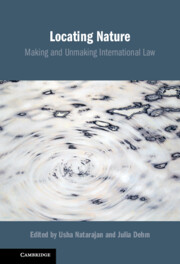Book contents
- Locating Nature
- Locating Nature
- Copyright page
- Contents
- Contributors
- Foreword
- Acknowledgements
- Introduction: Where Is the Environment?
- Part I Locating Nature in International Law
- Part II Unmaking International Law
- Part III Alternatives and Remakings
- 10 Three Enclosures of International Law
- 11 The Mythic Environment
- 12 Law and Politics of the Human/Nature
- 13 Narrating Nature
- 14 Inter-Nation Relationships and the Natural World as Relation
- Conclusion
- Index
12 - Law and Politics of the Human/Nature
Exploring the Foundations and Institutions of the ‘Rights of Nature’
from Part III - Alternatives and Remakings
Published online by Cambridge University Press: 22 September 2022
- Locating Nature
- Locating Nature
- Copyright page
- Contents
- Contributors
- Foreword
- Acknowledgements
- Introduction: Where Is the Environment?
- Part I Locating Nature in International Law
- Part II Unmaking International Law
- Part III Alternatives and Remakings
- 10 Three Enclosures of International Law
- 11 The Mythic Environment
- 12 Law and Politics of the Human/Nature
- 13 Narrating Nature
- 14 Inter-Nation Relationships and the Natural World as Relation
- Conclusion
- Index
Summary
This chapter explores the law and politics of the rights of nature, tracing the global process whereby ideals embraced by social movements travel through different continents. The chapter begins with the Ecuadorian and Bolivian experiences, where the rights of nature are part of a comprehensive approach that sustains the whole environmental system. It then considers narrower legislative developments in New Zealand and jurisprudence in Colombia and India endowing legal personhood to specific natural entities. That is to say, nature as a subject of rights may include the whole system of life, only specific entities such as rivers or forests, entitlement to represent nature before courts, the establishment of protected areas and so on. This chapter explores the history, theory and policy implications of the differential construction of such rights through dividing their development into four waves with differing epistemological and political rationalities. In so doing, this chapter unveils the tensions and contradictions inherent to the inclusion of the rights of nature within Western legality.
- Type
- Chapter
- Information
- Locating NatureMaking and Unmaking International Law, pp. 307 - 331Publisher: Cambridge University PressPrint publication year: 2022
- 1
- Cited by



